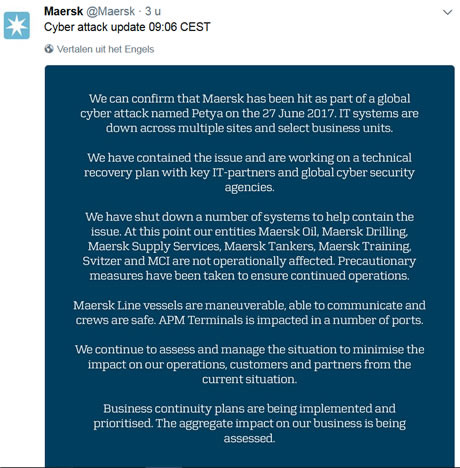On Tuesday afternoon hackers once again attacked computers on a large scale with a ransomware. One of those affected by the hack is APM Terminals, subsidiary of the shipping company Maersk. The virus knocked all systems down. Maersk Line also had to deal with the hackers. Customers received an email confirming the problems with the firm's IT systems.
Fruit importers who work with Maersk could do nothing but wait for their containers. There is no indication when these will be released. The one positive think about the timing of the hacking, that is that the amount of overseas fruit coming in at this time of year is not huge, and it is the beginning of the week.However, several companies have asked the question of who will foot the bill for this damage which have consequences down the chain.
According to reports, seventeen APM terminals have been affected, including those in Rotterdam. The systems have been down since 13.20 yesterday afternoon. In addition to the terminals in Rotterdam, those in New York are also affected and problems have been reported in Denmark. This morning, Maersk announced via Twitter that a recovery plan is being implemented. The problems seem to concentrate around the APM terminals.
In the latest mailing, Maersk writes: "Following on from our communications yesterday (27th June 2017) regarding the impact of the global cyber-attack, Petya, on A.P. Møller-Maersk group, we can confirm that some of our IT and communications infrastructure have been impacted and we have proactively shut down as a security measure.
For now this means the following:
- All immediate vessel operations will continue as planned, making the majority of planned port calls.
- Access to most ports is not impacted, however some APM Terminals are affected and gates are closed
- Cargo in transit will be offloaded as planned. Import Cargo will be released to credit customers
- At the present time we are unfortunately unable to serve new quotes or accept future bookings. However we do greatly appreciate your patience and look forward to carrying your cargo as soon as it is practically possible
- Unfortunately due to the impact on our IT and communications systems we are limited in our ability to communicate with you. We will continue to email you when appropriate and will be updating our Social Media channels regularly.
We apologize once again for any inconvenience this may cause your business and we are working hard to resume normal operations as soon as possible."
You can follow here the latest updates via the Twitter account of the shipping company.

The port of Rotterdam emphasises that the issue is not affecting the entire port and that the other terminals are working. The port authority itself has not been affected by the attack. In such major incidents, the other terminals can take over the work. This also happened recently during a storm.
APM Terminals and Maersk are not the only companies affected by the ransomware. In the east of the country, several companies have been hit by the hacks and TNT Express has also had to deal with the ransomware. In Belgium, the APM system is also down in the port of Zeebrugge, but no problems are reported in Antwerp. In Ukraine, public services, banks, energy companies and Kiev airport have all been hit by the hack. Ukrainians are accusing Russia of being responsible, but companies in Russia have also been affected. Moreover, there are companies hit in the United Kingdom, France, India and Poland.
Meanwhile, there are also reports that say it's not ransomware, but an attack. Since yesterday afternoon, no ransom can be paid anymore. Some experts have stated with great certainty that the purpose of the software is not to get money, but to cause as much damage as possible. The source of the virus is probably in Ukraine, where most victims are reported.

If a system is hit by the virus, files are encrypted and the computer can no longer be used. Against payment of a ransom, the computers and systems are released. The payment is always requested to be made in bitcoins. With this digital currency, the recipient can remain anonymous. Various security companies have warned about the use of ransomware and they expect this way of hacking to remain permanent a problem. In recent years, the use of malicious software has grown considerably, as have the ransom amounts requested.
In the Volkskrant, Floris van den Broek, director of the security company RedSocks, warns not to pay. According to the expert, you will end up on a 'suckerslist', a list of everyone who paid. This will make you an attractive victim to other hackers. In some cases, security companies can decrypt the files.
To avoid being hacked, the general advice applies: make sure you've installed the latest updates and make backups. And use your common sense and do not just click on links that look attractive. Also, you can encrypt files yourself to keep them better protected.


